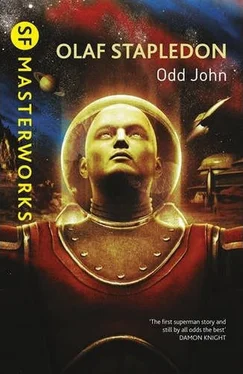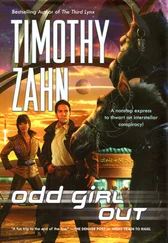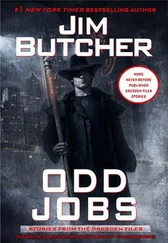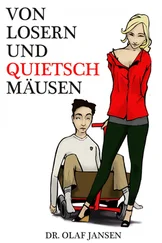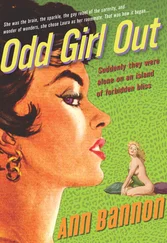Olaf Stapledon - Odd John
Здесь есть возможность читать онлайн «Olaf Stapledon - Odd John» весь текст электронной книги совершенно бесплатно (целиком полную версию без сокращений). В некоторых случаях можно слушать аудио, скачать через торрент в формате fb2 и присутствует краткое содержание. Город: London, Год выпуска: 2012, ISBN: 2012, Издательство: Hachette UK, Жанр: Фантастика и фэнтези, на английском языке. Описание произведения, (предисловие) а так же отзывы посетителей доступны на портале библиотеки ЛибКат.
- Название:Odd John
- Автор:
- Издательство:Hachette UK
- Жанр:
- Год:2012
- Город:London
- ISBN:9780450038570
- Рейтинг книги:5 / 5. Голосов: 1
-
Избранное:Добавить в избранное
- Отзывы:
-
Ваша оценка:
- 100
- 1
- 2
- 3
- 4
- 5
Odd John: краткое содержание, описание и аннотация
Предлагаем к чтению аннотацию, описание, краткое содержание или предисловие (зависит от того, что написал сам автор книги «Odd John»). Если вы не нашли необходимую информацию о книге — напишите в комментариях, мы постараемся отыскать её.
Odd John — читать онлайн бесплатно полную книгу (весь текст) целиком
Ниже представлен текст книги, разбитый по страницам. Система сохранения места последней прочитанной страницы, позволяет с удобством читать онлайн бесплатно книгу «Odd John», без необходимости каждый раз заново искать на чём Вы остановились. Поставьте закладку, и сможете в любой момент перейти на страницу, на которой закончили чтение.
Интервал:
Закладка:
Adlan’s object in moving to Port Saïd had been to put himself into touch with contemporary European life and thought, and if possible to make some kind of contact with India and China. The Canal was by now the most cosmopolitan spot in all the world. Levantines, Greeks, Russians, Lascars, Chinese firemen, Europeans on their way to the East, Asiatics on their way to London and Paris, Moslem pilgrims on their way to Mecca,—all passed through Port Saïd. Scores of races, scores of languages, scores of religions and cultures jostled one another in that most flagrantly mongrel town.
Adlan soon learned how to get the best out of his new environment. His methods were diverse, but all depended chiefly on telepathy and extreme intelligence. He constructed little by little in his own mind a very clear picture of European, and even Indian and Chinese culture. He did not, indeed, find any culture ready to hand in the minds of the beings with whom he made contact in Port Saïd, for they, residents and passengers alike, were nearly all quite philistine. But by a brilliant process of inference from the meagre and incoherent traces of thought in these migrants he was able to reconstruct the cultural matrix in which they had developed. This method he supplemented by reading books lent him by a shipping agent who had a liking for literature. He learned also to extend his telepathic reach to such an extent that, by conjuring up all that he knew of John Ruskin (let us say), he could make contact with that didactic sage in his remote home by Coniston Water.
Presently it became evident to Adlan that the really interesting period of European thought lay in the future. Could he, then, explore the future as he had explored the past? This proved a far more difficult task, and one which he could never have performed at all effectively had he not, by great good luck, discovered John, a mind of somewhat the same calibre as his own. He conceived the idea of teaching that fellow-supernormal to reach back into the past to him, so that he himself might learn about the future without the precarious and dangerous labour of projecting himself into it.
I was surprised to hear from John, that, though only a few weeks had passed since our arrival in Egypt, he had in that period spent many months with Adlan. Or perhaps I should say that his interviews with Adlan (through the mind of Harry) were distributed over a period of many months in Adlan’s life. Day after day the old man would ferry the Robinsons to their bathhouse, pulling steadily at his battered oars, and prattling in kitchen Arabic to Harry about ships and camels. And at the same time he would be carrying on a most earnest and subtle telepathic conversation with John about relativity or the quantum theory or the economic determination of history. John was soon convinced that he had encountered a mind which either through native superiority or though prolonged meditation was far in advance of his own, even in ability to cope with Western European culture. But Adlan’s brilliance made his way of life seem all the more perplexing. With sonic complacency John assured himself that if he were to live as long as Adlan he would not have to spend his old age toiling for a pittance from Homo sapiens . But before he parted from Adlan he began to take a humbler view of himself and a more respectful attitude to Adlan.
The old man was greatly interested in John’s biological knowledge, and its bearing upon himself and John. “Yes,” he said, “we are very different from other men. I have known it since I was eight. Indeed these creatures that surround us are scarcely men at all. But perhaps, my son, you take that difference too seriously. No, I should not say that. What I mean is that though for you this project of founding the new species is the true way, for me there is another way. And each of us must serve Allah in the way that Allah demands of him.”
It was not, John explained, that Adlan threw cold water on his great adventure. On the contrary he entered into it with sympathy and made many helpful suggestions. Indeed one of his favourite occupations, as he plied his oars, was to expound to John with prophetic enthusiasm the kind of world that “John’s New Men” would make, and how much more vital and more happy it would be than the world of Homo sapiens . This enthusiasm was undoubtedly sincere, yet, said John, there was a delicate mockery behind it. It was not wholly unlike the zeal with which grown men enter into the games of children. One day John deliberately challenged him by referring to his project as the greatest adventure that man could ever face. Adlan was resting on his oars before crossing the harbour, for an Austrian Lloyd steamer was passing into the Canal. Harry was intent upon the liner, but John induced him to turn his eyes on the old boatman. Adlan was looking gravely at the lad. “My son, my dear son,” he said, “Allah wills of his creatures two kinds of service. One is that they should toil to fulfil his active purpose in the world, and that is the service which you have most at heart. The other is that they should observe with understanding and praise with discriminate delight the excellent form of his handiwork. And this is my service, to lay at Allah’s feet such a life of praise that no man, not even you, my very dear son, can give him. He has fashioned you in such a manner that you may serve him best in action, though in action inspired always by deep-searching contemplation. But me he has fashioned such that I must serve him directly through contemplation and praise, though for this end I had first to pass through the school of action.”
John protested that the end of praise would be far better served by a world of the New Men than by a few isolated lofty spirits in a world of subhuman creatures; and that, therefore, the most urgent of all tasks was to bring such a world into being.
But Adlan replied, “It seems so to you, because you are fashioned for action, and because you are young. And indeed it is so. Spirits of my kind know well that in due season spirits of your kind will in fact create the new world. But we know also that for us there is another task. It may even be that part of my task is actually to peer so far into the future that I may see and praise those great deeds which you, or some other, are destined to perform.”
When John had reported this speech to me he said, “Then the old man broke off his communication with me, and also ceased prattling to Harry. Presently he thought to me again. His mind embraced me with grave tenderness, and he said, ‘It is time for you to leave me, you very dear and godlike child. I have seen something of the future that lies before you. And though you could bear the foreknowledge without faltering from the way of praise, it is not for me to tell you.’ Next day I met him again, but he was uncommunicative. At the end of the trip, when the Robinsons were stepping out of the boat, he took Harry in his arms and set him on the land, saying in the lingo that passed as Arabic with European residents, ‘’L hwaga swoia, quais ketir!’ (the little master, very nice). To me he said in his thoughts, ‘To-night, or perhaps to-morrow, I will die. For I have praised the past and the present, and the near future too, with all the insight that Allah has given me. And peering into the farther future,’ have been able to see nothing but obscure and terrible things which it is not in me to praise. Therefore it is certain that I have fulfilled my task, and may now rest.’”
Next day another boat took Harry and his parents to the bath-houses.
CHAPTER XVII
NG-GUNKO AND LO
IT will be remembered that we booked passages for three persons by Orient to Toulon and England. The third member of the party turned up three hours before the ship sailed.
Читать дальшеИнтервал:
Закладка:
Похожие книги на «Odd John»
Представляем Вашему вниманию похожие книги на «Odd John» списком для выбора. Мы отобрали схожую по названию и смыслу литературу в надежде предоставить читателям больше вариантов отыскать новые, интересные, ещё непрочитанные произведения.
Обсуждение, отзывы о книге «Odd John» и просто собственные мнения читателей. Оставьте ваши комментарии, напишите, что Вы думаете о произведении, его смысле или главных героях. Укажите что конкретно понравилось, а что нет, и почему Вы так считаете.
